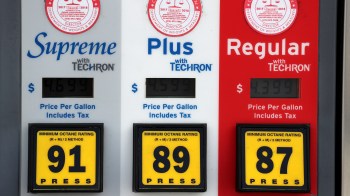Driving past the biofuel pump
TEXT OF STORY
Kai Ryssdal: The Environmental Protection Agency said this week it needs more time to think about alternative fuels.
A couple of months ago Texas Governor Rick Perry asked for a waiver of federal rules that require ethanol use in gasoline. Perry said the rules are pushing up the price of corn, which is raising feed costs for Lone Star cattlemen.
Meanwhile, drivers are looking for an alternative to pricey gas and they’ve been disappointed to see biofuels shoot up just as high.
From KPLU in Seattle, Tom Banse reports the alt-fuel business is proving tougher than anticipated.
Gas Station Attendant: $40, E-10…
Tom Banse: Just off Interstate 5 in Eugene, Oregon, sits a different kind of gas station. It sells only biofuel blends. You can get corn-based ethanol or diesel drivers can choose from several grades of biodiesel — that’s made from vegetable oil.
Mason Goche was an early customer, now assistant station manager. Even he feels the pinch of soaring prices.
Mason Goche: I bike to work more often now that gas prices are expensive.
Banse: And you work at a gas station?
Goche: And I work at the gas station!
This should’ve been the dawn of a golden age for biofuels. Instead, producers and sellers are having to scale back their business plans. Refiners are getting hammered by rising crop prices. For example, soybeans have doubled in price over the last year. That translates into around $5 a gallon at the pump for pure biodiesel.
Goche: It is really hurting business. You know, as an alternative company so to speak and having alternative customers, our target market is more likely to ride a bike or take a bus.
Customer Kerry Leek chooses the biofuels station less often these days. He says he stopped at the bank to make sure he had enough money before coming to the station.
Kerry Leek: Yeah, I’m not sure I’m sold on biofuels. Everything I’m hearing, it’s like the carbon footprint seems to be pretty high. Plus it’s driving up the cost of food.
Customer Carol Metzler also pays attention to the food versus fuel controversy, but she remains loyal because she wants to reduce the country’s reliance on petroleum.
Carol Metzler: So I’ve continued to buy here and continued to focus on biofuels because I still think it’s part of the solution.
Consumer acceptance is one thing. Then there’s the industrial customers who buy by the millions of gallons. Seattle’s metro transit had been using 20 percent biodiesel to fuel their buses. But this spring, they let the contract expire.
Transit director Kevin Desmond says paying a few cents extra for renewable fuel was tolerable, but today’s nearly $1 a gallon differential forced his hand.
Kevin Desmond: I think what we looked at in effect: Do you spend $2 million to continue to pay for biofuels, but cut service to pay for that or do you continue to provide the service for the thousands and thousands of people that are clamoring now for transit service? We made the pretty obvious choice. We’re going to preserve service and we’ll set aside the bio-program for now until things settle out a little bit better.
Another large volume customer abandoning pricy biodiesel is Royal Caribbean Cruise Lines.
Meanwhile, entrepreneur Rob Elam is growing a chain of retail biofuel stations based in Seattle. Is he more cautious now? Yes. Scared? No.
Rob Elam: As petroleum goes to $140 per barrel and beyond, there’s no end in Iraq in sight, the people continue to demand something new and a change and empowerment and they know there are tough choices to be made.
Policymakers keep trying to shape those choices and shore up the industry. Starting next year, federal law requires more ethanol or biodiesel to be blended into regular fuel. Also, grant money and private investment is flowing to companies working on non-food sources for biofuels.
In Seattle, I’m Tom Banse for Marketplace.
There’s a lot happening in the world. Through it all, Marketplace is here for you.
You rely on Marketplace to break down the world’s events and tell you how it affects you in a fact-based, approachable way. We rely on your financial support to keep making that possible.
Your donation today powers the independent journalism that you rely on. For just $5/month, you can help sustain Marketplace so we can keep reporting on the things that matter to you.


















